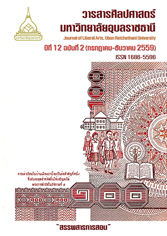ภาษากับอุดมการณ์การศึกษาในรายการโทรทัศน์ “เดินหน้าประเทศไทย”
Main Article Content
บทคัดย่อ
ผลการศึกษา พบกลวิธีทางภาษาที่รายการโทรทัศน์เดินหน้าประเทศไทยใช้สื่ออุดมการณ์ 5 วิธี ได้แก่ การเลือกใช้คำศัพท์ การอ้างส่วนใหญ่ การใช้อุปลักษณ์ การใช้คำขวัญ และการใช้ความเชื่อที่มีอยู่ก่อน เพื่อนำเสนออุดมการณ์การศึกษาที่ประกอบด้วยชุดความคิดเกี่ยวกับการศึกษาที่ดีและไม่ดี กลวิธี ทางภาษาข้างต้นยังนำเสนอชุดความคิดเกี่ยวกับระบบการศึกษา ผู้เรียนและพลเมืองที่รัฐต้องการเมื่อเข้าสู่ระบบการศึกษาและจบการศึกษาด้วย
ความสัมพันธ์ระหว่างภาษากับอุดมการณ์ในรายการโทรทัศน์เดินหน้าประเทศไทยสะท้อนให้เห็นอุดมการณ์การศึกษาว่า การศึกษาระบบเดิมประสบปัญหา แสดงความสัมพันธ์เชิงอำนาจของรัฐบาลที่มีความชอบธรรมในการปฏิรูปหรือพัฒนาการศึกษาตามแนวทางของรัฐบาล ภาษามีความสัมพันธ์โดยตรงต่อการเลือกเสนออุดมการณ์ของรัฐโดยผ่านการใช้ภาษาของพิธีกรและแขกรับเชิญในรายการเป็นหลัก
นอกจากนี้รายการนี้ยังสื่อความเชื่อที่มีอยู่ก่อนในด้านระบบค่านิยมด้านการศึกษาของสังคมไทยว่า คนไทยนิยมเรียนสูงเพื่อยกระดับสถานะทางสังคมที่สัมพันธ์เกี่ยวโยงไปถึงเรื่องชนชั้นในสังคม ซึ่งฝังรากลึกมาอย่างยาวนาน การที่รัฐพยายามสื่ออุดมการณ์และค่านิยมใหม่เพื่อเปลี่ยนค่านิยมเดิมจึงเป็นอีกช่องทางหนึ่งที่รัฐให้ความสำคัญ หากรัฐประสบความสำเร็จในการสื่ออุดมการณ์และค่านิยมดังกล่าวย่อมส่งผลดีต่อการบรรลุความมุ่งหมายของรัฐและสนับสนุนความสัมพันธ์เชิงอำนาจในแง่ “ความสำเร็จ” ของรัฐ ซึ่งส่งผลต่อการอ้างถึงและประกอบสร้างวาทกรรมใหม่เพื่อดำเนินงานอื่น ๆ ต่อไป
The study was projected to study the language strategies used to present educational ideologies from the “Dern Nah Pra Ted Thai: Thailand Moves Forward” program. According to critical discourse analysis of Fairclough combined with social cognitive analysis approach of Van Dijk, 16 episodes had been on air since 6th June 2014 to 20th March 2016.
The finding indicated that 5 linguistics strategies are adopted in the “Dern Nah Pra Ted Thai: Thailand Moves Forward” program representing the good educational ideologies and the poor educational ideologies. Some points of view that appear in the “Dern Nah Pra Ted Thai: Thailand Moves Forward” included 1) a good educational system 2) a good student 3) a good citizen of Thai society.
The relationship between languages and ideologies was about the education ideologies in which many problems occurred in the old system. The government was righteous to “reform” and “develop”. The language was related to the government power to control language used in the program. In addition to the educational value of Thai society admirable to the bachelor degree, it was based on the “bachelor degree evaluated with social status value”.
The attempt to represent ideologies and new value was very important event though this government achieves with their objectives to change the old education value, exactly they can postulates “the achievement” to perform any discourse and to actualize another task.


